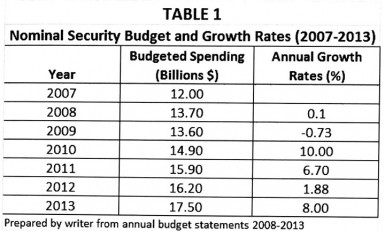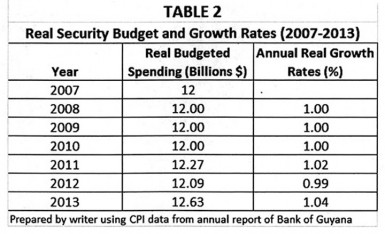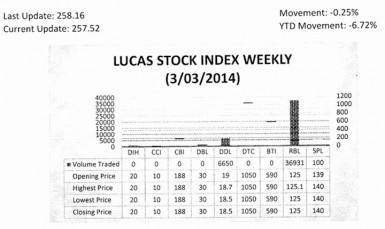Law and order
Irrespective of the political system, there is general agreement that the safety and security of people are the responsibility of governments. Academics and practitioners alike regard security of people as a public (good) service which cannot be provided efficiently by the market. Not everyone would be able to buy security services. More importantly, not everyone would need to buy such security services since non-paying persons could benefit from the protection just as much as those who pay. The task is therefore left to governments to deliver the service as best as they can. The responsibility of protecting and defending the country is usually assigned to the military. The task of maintaining law and order within the borders of the country is left to the police force, even though there are instances when both the military and the police undertake joint operations. The examination of anticipated spending on security in this article is confined to the work of the police force and the justice system that is supposed to support it.
Effectiveness and credibility
![]() If the level of spending on safety and security was all that mattered, Guyanese would have little to complain about. From 2008 to 2013, the administration spent nearly $92 billion in the name of security. This is equivalent to $59 being spent on every person in Guyana on a daily basis. The effectiveness and credibility of the work of the police force must be backed up by an effective and credible judicial system. Over the same period, Guyana spent an additional $12 billion in the name of justice. Despite the level of spending, the police do not have the best image or reputation in Guyana. Many years of injudicious conduct and too many unsolved crimes have damaged the reputation of the force. The confidence of citizens in law enforcement has dwindled. Far too many police ranks and officers are caught perpetrating crimes. Police stations themselves are no haven for protection as property goes missing from within the walls of these entities.
If the level of spending on safety and security was all that mattered, Guyanese would have little to complain about. From 2008 to 2013, the administration spent nearly $92 billion in the name of security. This is equivalent to $59 being spent on every person in Guyana on a daily basis. The effectiveness and credibility of the work of the police force must be backed up by an effective and credible judicial system. Over the same period, Guyana spent an additional $12 billion in the name of justice. Despite the level of spending, the police do not have the best image or reputation in Guyana. Many years of injudicious conduct and too many unsolved crimes have damaged the reputation of the force. The confidence of citizens in law enforcement has dwindled. Far too many police ranks and officers are caught perpetrating crimes. Police stations themselves are no haven for protection as property goes missing from within the walls of these entities.
Faulty judicial system
Not all of the problems are of their own making. Some are tied to a faulty judicial system that is the repository of thousands of outstanding cases. Case files go missing routinely and perpetrators of crime and violators of the law seem able to walk away from justice scot free. As one person remarked in a conversation, the judiciary is in competition with the police in a race to the bottom.
Ruthless political culture
Some of the difficulties relating to the safety and security of Guyanese are also tied to the ruthless and uncaring political culture that has emerged in Guyana. Political leaders appear unwilling to do the right thing. For example, they pay lip service to public accountability, but resist setting up constitutional bodies like the Public Procurement Commission (PPC) that could help increase confidence in public service. Further, they condemn corruption while refusing to act on glaring criminal evidence linked to the misappropriation of state funds. They refuse to respect and obey the very laws that they make and ask the police to enforce.
Lost confidence
 It is not surprising to hear many Guyanese lament, on a daily basis, the breakdown in law and order in the society. They have lost confidence in the judicial system as they see relatives and friends held and incarcerated for minor infractions or doing the “weekend” stay in the lockups on a questionable basis while violators among the well-connected walk the roads freely. A once proud and admirable judicial system now carries the shame of a corrupt system of government around its neck like an albatross.
It is not surprising to hear many Guyanese lament, on a daily basis, the breakdown in law and order in the society. They have lost confidence in the judicial system as they see relatives and friends held and incarcerated for minor infractions or doing the “weekend” stay in the lockups on a questionable basis while violators among the well-connected walk the roads freely. A once proud and admirable judicial system now carries the shame of a corrupt system of government around its neck like an albatross.
Reality
This reality exists after six years of ostensibly spending money on improving the operational and leadership capability of the police. It comes after in excess of $1 billion was spent on upgrading computer and communication systems. Mobile assets were acquired during this period to the tune of $1.2 billion. It is ironic that, after spending substantial amounts of money on improving intelligence gathering and analysis systems, there remain many instances where narcotics are able to leave Guyana undetected. In addition, many high-profile crimes go unsolved.
It is against this background anticipations of the 2014 budget are being made. The upward trend in nominal spending as shown in Table 1 below was likely to continue, even though the money to fight crime and to make the security services better flows in an inconsistent pattern. There was a substantial reduction in spending in 2009 and in 2012. Overall, the allocation to the security sector grew by an annual average of six per cent. One expects that this growth rate would continue in 2014, unless the administration intends to call early elections in which case there could be a greater allocation to this sector of the economy. In contrast, the justice sector grew by an annual average of 10 per cent, even though there is a higher degree of variability in spending on justice. The data is not shown here, but except for a 41 per cent increase in 2011, there has actually been a five per cent reduction in spending in 2010 and a 13 per cent reduction in 2012.
There is a more interesting story from an examination of the real spending on security as could be seen from Table 2 below. The data may contain some of the reasons law enforcement appears weaker and hamstrung. The equipment, vehicles and other goods and services required to get the job done are not increasing. These have virtually remained stagnant. The police force has, in effect, been left with the same quantity of resources over the past six years to do an increasingly difficult job. Put another way, the good men and women of this nation are being asked to fight crime with their hands tied behind their backs. It is a shame that the law-abiding citizens of this nation cannot depend on the police to protect them, in spite of all the money that they give up each year to fund the activities of the force.
Hurt
The situation facing the justice system is worse. In real terms, every year since 2008, it has lost 1.3 per cent of the resources needed to do the job. A system that ought to be independent and free is being restrained by political dominance. It is not surprising therefore to find the level of disaffection with the security and justice system to be high among Guyanese who care about the country. A serious effort must be made to ensure that the constitutional expectation that the primary activities of the justice system should be funded directly from the Consolidated Fund is realized.
Otherwise, the hurt will continue.
LUCAS STOCK INDEX
The Lucas Stock Index (LSI) declined 0.25 per cent in trading during the first week of March 2014. The stocks of three companies were traded with a total of 43,681 shares changing hands. There was one Climber and one Tumbler. The shares of Sterling Products Limited (SPL) rose 0.72 per cent on the sale of 100 shares while those of Demerara Distillers Limited (DDL) fell 2.63 per cent on the sale of 6,650 shares. The shares of Republic Bank Limited (RBL) remained stable on the sale of 36,931 shares.








